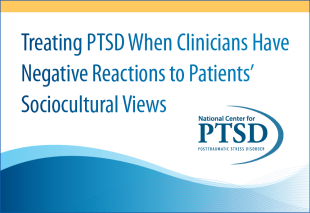PTSD: National Center for PTSD
Treating PTSD When Clinicians Have Negative Reactions to Patients' Sociocultural Views
Continuing Education
This section brings together free in-depth Continuing Education resources for the Professional community concerned with trauma.
Treating PTSD When Clinicians Have Negative Reactions to Patients' Sociocultural Views
- Date Created: 06/24/2022
- Time to Complete: 1 hour
- Credits: ANCC, APA, ASWB, ACCME, NBCC, Other Orgs
- Skill Level: Intermediate
- Course Series: PTSD 101, PTSD Consultation Lecture Series
 Author(s):
Author(s):
Description
Evidence-based treatment guidelines help clinicians provide effective PTSD care; however, mental health providers may experience difficulties if they have negative reactions to patients' sociocultural views. Examples range from a clinician disagreeing with a patient's political views to a clinician being offended by a patient's use of racist language. During periods of stressful, overlapping and prolonged events—racial injustice, COVID-19 pandemic, severe climate events—the need for strategies to help PTSD clinicians manage these experiences is particularly relevant.
The authors discuss how to develop a concept of patients' sociocultural views within and outside of a trauma framework. Case conceptualization strategies are presented to help providers decide when and how to address patient views of sociocultural concerns within evidence-based PTSD care.
Goals and Objectives
- Describe difficulties that PTSD clinicians have when having negative reactions to patients' sociocultural views
- Identify strategies PTSD clinicians can utilize if they have negative reactions to a patients' sociocultural views
- Assess and develop a conceptualization of patients' views either within or outside of a trauma framework
- Learn strategies to use case conceptualization to decide when and how to address patient views within PTSD evidence-based treatment
- Describe difficulties that PTSD clinicians have when having negative reactions to patients' sociocultural views
- Identify strategies PTSD clinicians can utilize if they have negative reactions to a patients' sociocultural views
- Assess and develop a conceptualization of patients' views either within or outside of a trauma framework
- Learn strategies to use case conceptualization to decide when and how to address patient views within PTSD evidence-based treatment


























